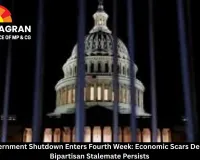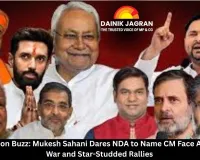Trump Alleges Covert Pakistan Nuclear Tests, Rattling South Asia
Digital Desk
A claim by U.S. President Donald Trump that Pakistan is secretly testing nuclear weapons has intensified global non-proliferation concerns and heightened tensions in an already volatile region.
In a televised interview that has sent ripples through international security circles, U.S. President Donald Trump alleged that Pakistan is among the nations covertly conducting nuclear weapons tests.
The assertion, which Pakistan has formally denied, threatens to destabilize the delicate security equilibrium in South Asia and has sparked concerns of a renewed nuclear arms race.
The Allegation and Official Denial
In his interview with CBS's 60 Minutes, Trump stated that several countries are actively advancing their nuclear capabilities. “Russia’s testing and China’s testing, but they don’t talk about it...
Certainly North Korea’s been testing. Pakistan’s been testing,” he claimed, justifying his recent directive for the United States to resume its own nuclear tests after a 33-year moratorium .
Trump argued that these nations perform tests “way underground where people don't know exactly what's happening,” suggesting that the activities are deliberately concealed from international detection .
In response to the allegation, a senior Pakistani security official issued a swift rebuttal to CBS News, reaffirming the country's longstanding policy. “
Pakistan was not the first to carry out nuclear tests and will not be the first to resume nuclear tests,” the official stated, echoing the government's official position of maintaining a unilateral moratorium on nuclear testing .
A History of Regional Nuclear Rivalry
The geopolitical context of Trump's claim is critical. Both India and Pakistan publicly demonstrated their nuclear weapons capabilities in a series of tests in 1998, becoming de facto nuclear-armed states . Since then, a tense and costly arms race has defined their relationship.
According to the Stockholm International Peace Research Institute (SIPRI), both nations continued to modernize and enlarge their arsenals in 2024 .
This ongoing rivalry is set against a backdrop of periodic conventional conflicts, including a four-day military confrontation in May 2025, which saw missile strikes and heightened fears of escalation .
Strategic Implications for India and the World
Trump’s revelation, if accurate, carries profound implications for regional security, particularly for India. The country already faces a two-front challenge from nuclear-armed Pakistan and China, which is itself rapidly expanding its nuclear arsenal .
Analysts suggest that evidence of renewed testing by Pakistan could pressure India to consider ending its own testing moratorium. A potential "Pokhran-III" series of tests has been discussed in security circles as a way for India to validate new weapon designs and keep pace with its rivals .
Beyond South Asia, Trump's move signals a potential paradigm shift in global nuclear dynamics. The SIPRI Yearbook 2025 recently warned that “a dangerous new nuclear arms race is emerging at a time when arms control regimes are severely weakened” .
The resumption of testing by any major power, especially the U.S., could dismantle decades of non-proliferation efforts.
A Veiled Confirmation of Military Modernization
While Pakistan denies conducting nuclear explosive tests, the country's military has been unequivocal about its intent to continue weapons development.
Just one day after Trump's interview, the Director-General of Pakistan's Inter-Services Public Relations (ISPR), stated that Pakistan is “not bound to make missile tests public” and would “continue to carry out tests [and] trials as required for national security” .
This statement highlights the fine line between testing nuclear warheads and testing the delivery systems that carry them—such as missiles which Pakistan continues to do openly. This ongoing modernization ensures that the nuclear threat in South Asia remains both active and potent.
As the international community grapples with these developments, the claims and counter-claims emanating from Washington and Islamabad have added a new layer of uncertainty to one of the world's most enduring and dangerous security dilemmas.
The situation underscores the fragile nature of nuclear deterrence and the high stakes of diplomatic and military miscalculations.




.jpg)


.jpg)


.jpg)
